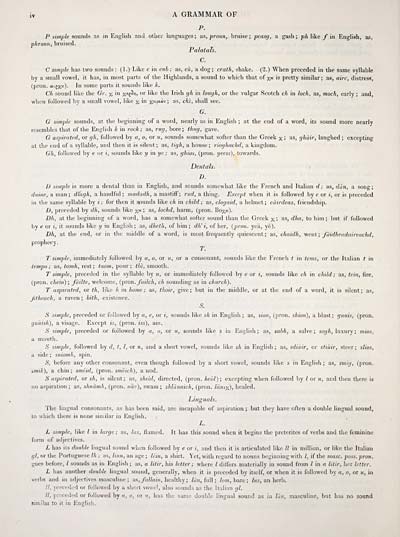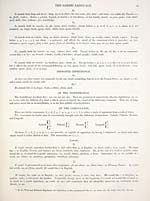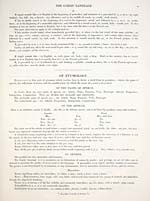Download files
Complete book:
Individual page:
Thumbnail gallery: Grid view | List view

iv A GRAMMAR OF
P.
P simple sounds as in English and other languages; -ds, pronn, bruise; peasg, a gash; pft like / in English, as,
phronn, bruised.
Palatals.
C.
C simple has two sounds: (1.) Like c in cub ; as, cù, a dog; crath, shake. (2.) When preceded in the same syllable
by a small vowel, it has, in most parts of the Highlands, a sound to which that of xi^ is pretty similar ; as, aire, distress,
(pron. ai^^K). In some parts it sounds like k.
Ch sound like the Gr. -^ '" X'^'^i or like the Irish jr/t in lough, or the vulgar Scotch ch in loch, as, moch, early ; and,
when followed by a small vowel, like ^ ™ x^'t^'" '> ^^■' ^^'> shall see.
G.
G simple sounds, at the beginning of a word, nearly as in English ; at the end of a word, its sound more nearly
resembles that of the English k in rock; as, rug, bore; thug, gave.
G aspirated, or gh, followed by a, o, or u, sounds somewhat softer than the Greek x '• as, ghàir, laughed ; excepting
at the end of a syllable, and then it is silent; as, tigh, a house ; rioghachd, a kingdom.
Gh, followed by e or i, sounds like y in ye ; as, ghios, (pron. yeess), towards.
Dentals. >
D.
D swiple is more a dental than in English, and sounds somewhat like the French and Italian d; as, dan, a song;
duine, a man ; dlagh, a handful ; madadh, a mastiff; rud, a thing. Except when it is followed by e or i, or is preceded
in the same syllable by i; for then it spunds like ch in child; as, clogaid, a helmet; càirdeas, friendship.
D, preceded by dh, sounds like p^x; as, lochd, harm, (pron. llo;^'')-
Dh, at the beginning of a word, has a somewhat softer sound than the Greek X' as, dha, to him ; but if followed
by c or i, it sounds like y in English ; as, dheth, of him ; dh' i, of her, (pron. yea, ye).
Dh, at the end, or in the middle of a word, is most frequently quiescent; as, chaidh, y/ent ; fùidheadaireachd,
prophecy.
T.
T simple, immediately followed by a, o, or u, or a consonant, sounds like the French t in te?ns, or the Italian t in
tempo; as, tamh, rest; tao7n, pour; tlii, smooth.
T simple, preceded in the syllable by !«, or immediately followed by e or i, sounds like ch in child ; as, tein, fire,
(pron. chein); fàilte, welcome, ([iron, failch, ch sounding as in church).
T aspirated, or th, like h in home; as, thoir, give; but in the middle, or at the end of a word, it is silent; as,
Jitheach, a raven ; biih, existence.
S.
S simple, preceded or followed by a, e, or i, sounds like sh in English ; as, sion, (pron. shion), a blast; gnuis, (pron.
guuish), a visage. Except is, (pron. iss), am.
S simple, preceded or followed by a, o, or v, sounds like s in Enolish ; as, sahh, a salve; so^A, luxury ; mios,
a mouth.
S simple, followed by d, t, I, or n, and a short vowel, sounds like sh in English; as, sdikir, or stiuir, steer; slios,
a side; stiiomh, spin.
S, before any other consonant, even though followed by a short vowel, sounds like s in English; as, S7nig, (pron.
smik), a chin; smeid, (pron. smeich), a nod.
S aspirated, or sh, is silent; as, shebl, directed, (pron. heal); excepting when followed by I or n, and then there is
no aspiration ; as, shnàmh, (pron. nav), swam ; shlànuich, (pron. làmx), healed.
Linguals.
The lingual consonants, as has been said, are incapable of aspiration ; but they have often a double lingual sound,
to which there is none similar in English.
L.
L simple, like I in large ; as, las, Hamed. It has this sound when it begins the preterites of verbs and the feminine
form of adjectives.
L has its double lingual sound when followed by c or i, and then it is articulated like II in million, or like the Italian
gl, or the Portuguese Ih ; as, linn, an age ; Uin, a shirt. Yet, with regard to nouns beginning with /, if the masc. pass. pron.
goes before, I sounds as in English ; as, o litir, his letter; where / differs materially in sound from Z in a litir, her letter.
L has another double lingual sound, generally, when it is preceded by itself, or when it is followed by a, o, or u, in
verbs and in adjectives masculine ; as, fallain, healthy ; lùn, full ; lorn, bare ; lus, an herb.
II, preceded or followed by a short vowe', also sounds as the Italian gl.
II, j);eceded or followed by a, o, o\ u, has the same double lingual sound as in Um, masculine, but has no sound
similar to it in Ensrlish.
P.
P simple sounds as in English and other languages; -ds, pronn, bruise; peasg, a gash; pft like / in English, as,
phronn, bruised.
Palatals.
C.
C simple has two sounds: (1.) Like c in cub ; as, cù, a dog; crath, shake. (2.) When preceded in the same syllable
by a small vowel, it has, in most parts of the Highlands, a sound to which that of xi^ is pretty similar ; as, aire, distress,
(pron. ai^^K). In some parts it sounds like k.
Ch sound like the Gr. -^ '" X'^'^i or like the Irish jr/t in lough, or the vulgar Scotch ch in loch, as, moch, early ; and,
when followed by a small vowel, like ^ ™ x^'t^'" '> ^^■' ^^'> shall see.
G.
G simple sounds, at the beginning of a word, nearly as in English ; at the end of a word, its sound more nearly
resembles that of the English k in rock; as, rug, bore; thug, gave.
G aspirated, or gh, followed by a, o, or u, sounds somewhat softer than the Greek x '• as, ghàir, laughed ; excepting
at the end of a syllable, and then it is silent; as, tigh, a house ; rioghachd, a kingdom.
Gh, followed by e or i, sounds like y in ye ; as, ghios, (pron. yeess), towards.
Dentals. >
D.
D swiple is more a dental than in English, and sounds somewhat like the French and Italian d; as, dan, a song;
duine, a man ; dlagh, a handful ; madadh, a mastiff; rud, a thing. Except when it is followed by e or i, or is preceded
in the same syllable by i; for then it spunds like ch in child; as, clogaid, a helmet; càirdeas, friendship.
D, preceded by dh, sounds like p^x; as, lochd, harm, (pron. llo;^'')-
Dh, at the beginning of a word, has a somewhat softer sound than the Greek X' as, dha, to him ; but if followed
by c or i, it sounds like y in English ; as, dheth, of him ; dh' i, of her, (pron. yea, ye).
Dh, at the end, or in the middle of a word, is most frequently quiescent; as, chaidh, y/ent ; fùidheadaireachd,
prophecy.
T.
T simple, immediately followed by a, o, or u, or a consonant, sounds like the French t in te?ns, or the Italian t in
tempo; as, tamh, rest; tao7n, pour; tlii, smooth.
T simple, preceded in the syllable by !«, or immediately followed by e or i, sounds like ch in child ; as, tein, fire,
(pron. chein); fàilte, welcome, ([iron, failch, ch sounding as in church).
T aspirated, or th, like h in home; as, thoir, give; but in the middle, or at the end of a word, it is silent; as,
Jitheach, a raven ; biih, existence.
S.
S simple, preceded or followed by a, e, or i, sounds like sh in English ; as, sion, (pron. shion), a blast; gnuis, (pron.
guuish), a visage. Except is, (pron. iss), am.
S simple, preceded or followed by a, o, or v, sounds like s in Enolish ; as, sahh, a salve; so^A, luxury ; mios,
a mouth.
S simple, followed by d, t, I, or n, and a short vowel, sounds like sh in English; as, sdikir, or stiuir, steer; slios,
a side; stiiomh, spin.
S, before any other consonant, even though followed by a short vowel, sounds like s in English; as, S7nig, (pron.
smik), a chin; smeid, (pron. smeich), a nod.
S aspirated, or sh, is silent; as, shebl, directed, (pron. heal); excepting when followed by I or n, and then there is
no aspiration ; as, shnàmh, (pron. nav), swam ; shlànuich, (pron. làmx), healed.
Linguals.
The lingual consonants, as has been said, are incapable of aspiration ; but they have often a double lingual sound,
to which there is none similar in English.
L.
L simple, like I in large ; as, las, Hamed. It has this sound when it begins the preterites of verbs and the feminine
form of adjectives.
L has its double lingual sound when followed by c or i, and then it is articulated like II in million, or like the Italian
gl, or the Portuguese Ih ; as, linn, an age ; Uin, a shirt. Yet, with regard to nouns beginning with /, if the masc. pass. pron.
goes before, I sounds as in English ; as, o litir, his letter; where / differs materially in sound from Z in a litir, her letter.
L has another double lingual sound, generally, when it is preceded by itself, or when it is followed by a, o, or u, in
verbs and in adjectives masculine ; as, fallain, healthy ; lùn, full ; lorn, bare ; lus, an herb.
II, preceded or followed by a short vowe', also sounds as the Italian gl.
II, j);eceded or followed by a, o, o\ u, has the same double lingual sound as in Um, masculine, but has no sound
similar to it in Ensrlish.
Set display mode to: Large image | Transcription
Images and transcriptions on this page, including medium image downloads, may be used under the Creative Commons Attribution 4.0 International Licence unless otherwise stated. ![]()
| Early Gaelic Book Collections > Blair Collection > Gaelic dictionary, in two parts > (26) |
|---|
| Permanent URL | https://digital.nls.uk/79284461 |
|---|
| Description | A selection of books from a collection of more than 500 titles, mostly on religious and literary topics. Also includes some material dealing with other Celtic languages and societies. Collection created towards the end of the 19th century by Lady Evelyn Stewart Murray. |
|---|
| Description | Selected items from five 'Special and Named Printed Collections'. Includes books in Gaelic and other Celtic languages, works about the Gaels, their languages, literature, culture and history. |
|---|

